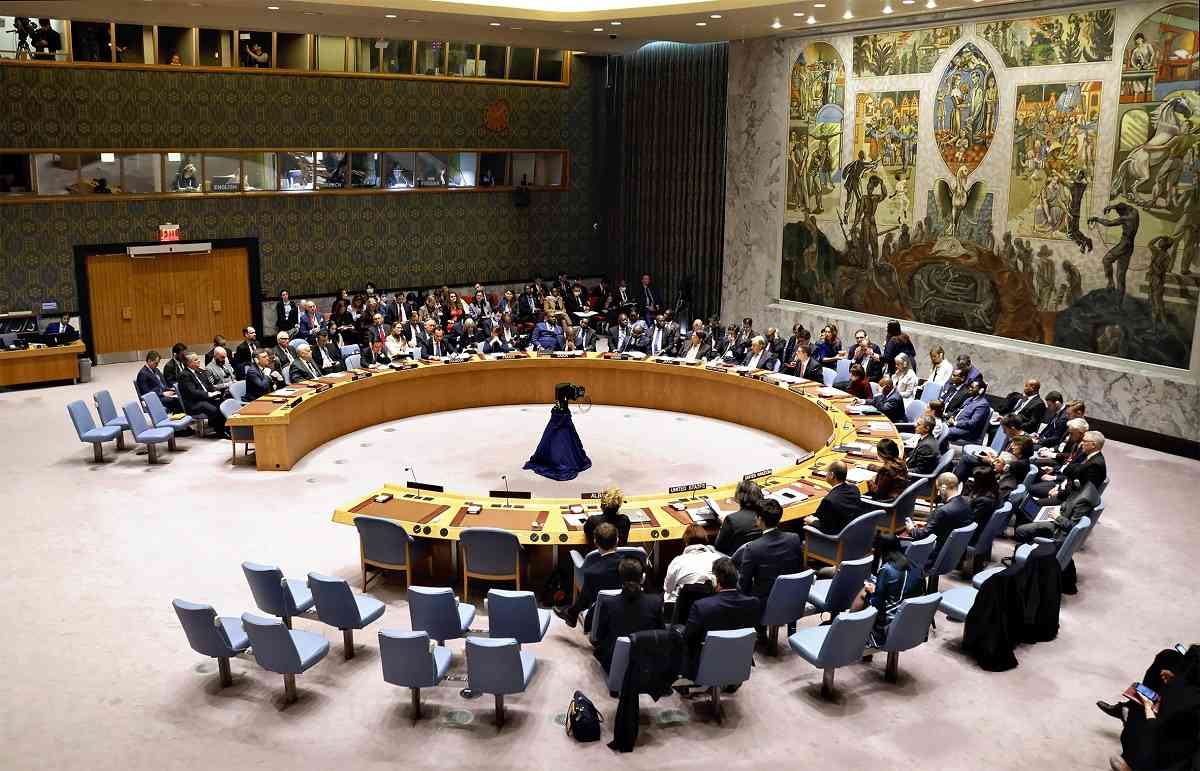- Political Series
- Future World Order
International Organizations / Russian Invasion Leads to Yearlong Vacuum on U.N. Council

The U.N. Security Council meets on Feb. 24, the one-year anniversary of the start of Russia’s invasion of Ukraine, at U.N. Headquarters in New York.
6:00 JST, July 18, 2023
Since the end of World War II, international organizations have contributed greatly to world order, especially the United Nations. This is the first installment of a series in which The Yomiuri Shimbun examines how international organizations are at a turning point due to changes in the world situation, such as Russia’s aggression in Ukraine.
***
A senior Russian representative to the United Nations expressed bitterness June 8 over the outcome of the same-day election for the Economic and Social Council (ECOSOC) at U.N. headquarters in New York.
Russia and North Macedonia vied fiercely for a seat in the Eastern European quota for the council. 23 votes on this issue have been held since June last year. A two-thirds majority of the ballots cast by the countries present is required to win the seat, and on that day, the winning line was 123 votes.
However, neither Russia nor North Macedonia were able to secure two-thirds of the ballots, with Russia receiving 102 votes and North Macedonia 82 votes. The council again failed to complete the election of members to the ECOSOC.
A U.N. official said it may never be decided.
The ECOSOC conducts research in various fields such as education and health, in cooperation with nongovernmental organizations. Although the activities of the ECOSOC are modest compared to those of the U.N. Security Council, it is one of the main U.N. organizations.
It is customary for countries to serve on the ECOSOC on a rotating basis, and Russia decided to run for a seat three years ago.
Following Russia’s invasion of Ukraine, the Western countries hurriedly put up North Macedonia, a member of the North Atlantic Treaty Organization, as Russia’s opponent in last year’s election for the council. Consequently, there remains one vacancy amongst the Eastern European states.
Time that should have been devoted to the deliberation of issues at hand has instead been spent on elections that are unlikely to be decided.
After the voting, a senior member of the Russian delegation to the United Nations reportedly made a threatening phone call to a Central Asian country that had cast a blank ballot, asking why it had not voted for Russia despite promising to do so.
“You do realize that our country is taking care of your country, including with our energy resources, don’t you?” the Russian official was quoted as saying.
The results of the elections for ECOSOC members are not supposed to be made public, so Russia should not know how this Central Asian country voted. It is believed Moscow obtained the information from a source within the United Nations.
Despite saying they could not talk about ECOSOC elections, a diplomat from a Central Asian country revealed the dilemma to The Yomiuri Shimbun: Russia is important for its supply of resources and other reasons, but the West will abandon the country if it does what Russia demands.
Countries openly exchange votes in elections for U.N. bodies. To prevent being double-crossed, they sometimes make a written record of their oral statements to each other, to prove they agreed to exchange votes.
Russia will lose face if it is unable to join the council. Following its invasion of Ukraine, Russia has lost key posts over the past year or so, including being suspended from the U.N. Human Rights Council and failing to win election to the governing board of UNICEF.
Western countries have been working to expel Russia from these key positions.
However, Russia’s permanent seat on the U.N. Security Council remains unaltered. The country uses the council to justify its aggression and exerts its influence by brandishing its veto power.
At an emergency meeting of the U.N. Security Council on June 2, following the launch of a military reconnaissance satellite by North Korea, the Japanese and U.S. ambassadors to the United Nations condemned North Korea. However, Russia’s Deputy Permanent Representative Anna Evstigneeva pointed to military exercises by the United States, Japan and South Korea and angrily argued that this military activity “has a destructive impact on the situation in the region.”
Since the Russian invasion of Ukraine, the U.N. Security Council has met more than 10 times on North Korea, but no decisions have been made. This is in contrast to the meetings held in 2016 and 2017, when strong sanctions resolutions were passed against North Korea for its repeated nuclear tests and ballistic missile launches.
China, which is at odds with the United States, has joined Russia in opposing the adoption of resolutions to condemn Pyongyang.
“North Korea is accelerating its nuclear and missile development, seeing now as an opportune time when there is little risk of sanctions due to Russia’s aggression,” said Maiko Takeuchi, who served the U.N. Security Council as a member of the Panel of Experts for North Korea from 2016 to 2021.
Top Articles in Politics
-

Japan PM Takaichi’s Cabinet Resigns en Masse
-

Sanae Takaichi Elected Prime Minister of Japan; Keeps All Cabinet Appointees from Previous Term
-

Japan’s Govt to Submit Road Map for Growth Strategy in March, PM Takaichi to Announce in Upcoming Policy Speech
-

LDP Wins Historic Landslide Victory
-

LDP Wins Landslide Victory, Secures Single-party Majority; Ruling Coalition with JIP Poised to Secure Over 300 seats (UPDATE 1)
JN ACCESS RANKING
-

Japan PM Takaichi’s Cabinet Resigns en Masse
-

Japan Institute to Use Domestic Commercial Optical Lattice Clock to Set Japan Standard Time
-

Israeli Ambassador to Japan Speaks about Japan’s Role in the Reconstruction of Gaza
-

Man Infected with Measles Reportedly Dined at Restaurant in Tokyo Station
-

Videos Plagiarized, Reposted with False Subtitles Claiming ‘Ryukyu Belongs to China’; Anti-China False Information Also Posted in Japan
























